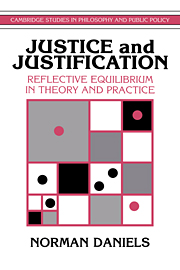Book contents
- Frontmatter
- Contents
- Preface
- 1 Introduction: Reflective equlibrium in theory and practice
- PART I
- PART II
- 9 Health-care needs and distributive justice
- 10 Equality of what: Welfare, resources, or capabilities?
- 11 Determining “medical necessity” in mental health practice, with James E. Sabin
- 12 The prudential life-span account of justice across generations
- 13 Problems with prudence
- 14 Merit and meritocracy
- 15 Rationing fairly: Programmatic considerations
- 16 Wide reflective equilibrium in practice
- Index
14 - Merit and meritocracy
Published online by Cambridge University Press: 01 February 2010
- Frontmatter
- Contents
- Preface
- 1 Introduction: Reflective equlibrium in theory and practice
- PART I
- PART II
- 9 Health-care needs and distributive justice
- 10 Equality of what: Welfare, resources, or capabilities?
- 11 Determining “medical necessity” in mental health practice, with James E. Sabin
- 12 The prudential life-span account of justice across generations
- 13 Problems with prudence
- 14 Merit and meritocracy
- 15 Rationing fairly: Programmatic considerations
- 16 Wide reflective equilibrium in practice
- Index
Summary
Sometimes a person has abilities and interests which enable him or her to fill a given job, position, or office - hereafter, I shall use only “job” - better than other available persons. In what sense do such abilities and interests constitute a basis for claiming the more capable person merits the job? Does the fact that someone possesses special abilities and interests which are needed for the superior performance of a job of considerable social importance and prestige allow that person a legitimate claim to greater rewards for the job? I shall explore some of the issues associated with these questions by analyzing the notion of a meritocracy, a social order built around a particular notion of merit. I hope that examination of such a hypothetical social order will allow me to assess the broader implications of this particular notion of merit for a theory of distributive justice.
I am not concerned with certain classical meritocracies, that is, with certain views of aristocracy according to which social class was thought to imply differences in merit or ability with positions and rewards conferred accordingly. Rather, I take as my model variants of the type of meritocracy portrayed by Michael Young who, in his now classic satire or fantasy, The Rise of the Meritocracy, anticipated many features of a social ideal adopted by more recent writers. Young imagines a worldwide society in the twenty-first century in which all assignments of jobs and rewards are based on merit.
- Type
- Chapter
- Information
- Justice and JustificationReflective Equilibrium in Theory and Practice, pp. 302 - 316Publisher: Cambridge University PressPrint publication year: 1996



